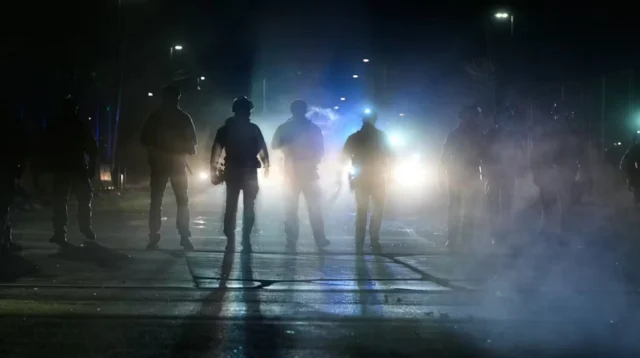Although the conflict between Israel and Palestine is one of the major geopolitical hotbeds, its influence on the American citizens has become more pronounced and troublesome in 2025. These are not theoretical war products, they are particular situations in which diplomatic accountability and human experience clash.
The arrest of Palestinian-American youths and activists indicates a developing humanitarian crisis, transforming the status of the U.S. foreign policy concerning the rights of their citizens in other countries.
Detention Of Palestinian-American Youths Amid Rising Tensions
The story of Mohammed Ibrahim, a Palestinian-American youth, with 16 years of age, who was detained by Israeli forces in the beginning of 2025 has become the symbol of the personal cost of the military activities in the West Bank. He is detained on thematic termless charges of stone-throwing, which should have no substantive basis according to his family and other observers of human rights.
The case of Mohammed demonstrates the trend towards increased legal uncertainty of the Palestinian-Americans when the Israeli escalation is experienced, such as staying under legal custody longer without trial and living under extremely poor prison facilities.
Conditions And Legal Challenges
During his half-year in Israeli imprisonment, Mohammed was confined to such prison facilities as the Moscow detention facility, which had a rigid regime and medical-ill conditions. According to reports by his family, his weight was significantly reduced, he had broken out in scabies, and that his isolation is prolonged, potentially indicating breaches of juvenile detention norms and more universal human rights.
Attempts to have legal representation and family visits have been thwarted time and again. The absence of judicial transparency to most of such cases involving dual-nationals and minors has been witnessed by the observers including rights organizations and questions have been raised of any uniformity of legal protection given to the American citizens.
A Diplomatic Strain In U.S.-Israel Relations
Along with personal losses, the incidences add to a bigger diplomatic tension between the U.S. and Israel. They serve as longstanding allies, but new issues arise in balancing the cooperation in the security field with civil rights of their citizens.
Washington has come under fire by advocacy groups over its measured response to the detention of Mohammed and it is apparent that there is a wider divide between policy statements and actual diplomatic actions.
A Complicated Bilateral Landscape
Such detention processes have been managed by the Trump administration with an aim of sustaining a strategic relationship with Israel and managing the political cost. Officials are calling it a matter of concern but have not come out to condemn the act or request their immediate release because, they argue, the process of diplomatic negotiations is underway.
This caution has been viewed by most Palestinian-Americans as the absence of putting the lives of its citizens first. It also raises questions about the zones covered by American consular protection as well as their success in areas of conflict where their allies are militarily engaged, affecting the American citizens.
Domestic Impact Among Palestinian-Americans
Deeply felt among the Palestinian and Arab diaspora in the United States are these cases. Community anxiety has risen as family members and friends have been involved in the conflict in many cases directly. On the same level, Gaza and West Bank-related political activism, too, has come under the investigation of immigration and law enforcement authorities.
Reports have also emerged of Palestinian-American students having their visas revoked and being put on immigration holds after they held pro-Gaza protests. The civil liberties groups state that these actions are the second iteration of politicized surveillance, and that it erodes the rights afforded by the first amendment.
The Intersection Of Human Rights And Security Narratives
Certainly, the suspicion of rising hostilities and settler violence on the occupied West Bank underlies the reason behind the decision of Israel to conduct more detention and security measures. However, the disposition of dual nationals–and, especially, minors–is the matter about which legal issues are of utmost concern under Israeli and international law.
The U.S., although claiming to be in support of the writ of universal rights, has not necessarily acted upon this diplomatic imperative when it comes to the detention of its own citizens in controversial, or even gray-area, circumstances.
Challenges To Legal Norms In Conflict Zones
The arrest and subsequent detention of Mohammed and others under similar conditions is against the provisions of the Convention on the Rights of the Child which forbids any detention exceeding an observably long period without any legal authorization. The U.S. itself often appeals to the application of these norms in international rights rhetoric but has had trouble actually applying them bilaterally when security ratings take center priority.
Legal experts and former United States diplomats caution that these irregularities concerning the protection of detained American citizens in other countries could open a precedent that could undermine U.S. credibility in promoting human rights particularly in the countries where it enjoys strategic military and economic alliances.
Pressure From Advocacy Networks
A request by Palestinian-American pressure groups and civil society has insisted on greater intervention. They want the direct involvement of the U.S. government in dealing with Israeli legal powers over the prisoners, visits by the U.S consular officers among the detainees and the transparency of all the American citizens detained in the West Bank and Gaza.
But such initiatives face the challenges of a political environment in which diplomatic concerns tend to trump humanitarian urges. Although Law Enforcement Agencies are optimistic regarding transborder transporting, it is understood that local jurisdiction is complicated and that running the risk of inflaming certain tensions is not ideal.
Voices Highlighting The Human Cost And Diplomatic Complexity
The commentary captures the dual burden carried by Palestinian-American families: navigating life in a U.S. political system that appears hesitant to confront its allies and watching loved ones endure hardship far from home. Their experiences bring visibility to what is often a quiet dimension of foreign policy—the unseen costs paid by civilians in proxy battles of power and principle.
Today I learned Israel is holding an American child hostage: 16-year-old Palestinian-American Muhammad Zaher Ibrahim has spent 5 months in Megiddo Prison—long known for torture—over rock-throwing accusations. He’s lost 26 pounds and contracted scabies. Where's the outrage? pic.twitter.com/G0ATJacb70
— jasper nathaniel (@infinite_jaz) July 31, 2025
Unfolding Implications For International Engagement
These developments pose a significant test for how the U.S. defines the obligations of citizenship in global conflict zones. If citizens can be detained indefinitely without trial or meaningful consular intervention, the foundational promise of state protection becomes uncertain.
Moreover, the diplomatic precedent set by silence—or inaction—may reverberate beyond the Israel-Palestine context. In similar future conflicts, other allies or partner governments may view such passivity as tacit approval for detaining dual nationals under broadly defined security justifications.
The ongoing Israel-Palestine conflict continues to evolve, but its effect on American citizens introduces a deeply personal dimension to what is often discussed in military or diplomatic terms. Behind each case lies a broader question: how should a country balance strategic alliances with its duty to protect all citizens equally, regardless of geography or political complexity? As the international community confronts protracted conflicts and shifting allegiances, the intersection of human rights, diplomacy, and national identity will likely remain a central challenge in the years ahead.





